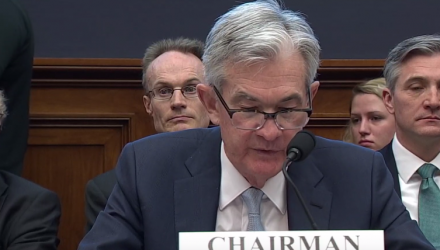In day two of his semiannual testimony to Congress, Federal Reserve Chairman Jerome Powell said that the central bank is close to its timetable of ending its balance sheet reduction. Powell is referring to the central bank’s holdings of about $3.8 trillion in bonds, which it has steadily been reducing since October 2017.
A separate statement last month alluded to a more flexible Fed that would be more strategic with regard to its balance sheet policy. The Fed is reducing its balance sheet by a maximum of $50 billion in proceeds from the sale of bonds, which it will use for reinvestment.
“We’re close to agreeing on a plan which would light then way to the end of the process,” Powell said during testimony before the House Financial Services Committee.
Furthermore, flexibility would also apply to its holdings of Treasuries and mortgage-backed securities, which signaled a diversion from statements that the central bank would resume its asset purchases if economic data warranted a rate cut. Powell said he expects a decision on the reduction soon, but no definitive time was set.
“We actually don’t know what the equilibrium demand will be. We’re going to have to find it over time,” Powell said. “My guess is we’ll be announcing something fairly soon.”
Powell also acknowledged that the capital markets are anticipating the balance sheet decision.
“I think the markets became much more sensitive to these issues,” Powell said.
Crosscurrents and Conflicting Signals
During the the first of two days of his semiannual testimony before Congress on Tuesday, Powell said that “crosscurrents and conflicting signals” are warranting a patient approach with respect to interest rate policy.
In a prepared testimony to Congress, Powell said that domestic and global developments have “along with ongoing government policy uncertainty, warranted taking a patient approach with regard to future policy changes.” Furthermore, Powell said that economic data will continue to be the primary driver in future Fed decisions, but will be more flexible with the inclusion of new data.
“Going forward, our policy decisions will continue to be data dependent and will take into account new information as economic conditions and the outlook evolve,’’ Powell told the Senate Banking Committee. “We’re in no rush to make a judgment about changes in policy.”
For investors looking for continued upside in U.S. equities over international equities, the Direxion FTSE Russell US Over International ETF (NYSEArca: RWUI) offers them the ability to benefit not only from domestic U.S. markets potentially performing well, but from their outperformance compared to international markets.
Conversely, if investors believe that international markets will outperform U.S. domestic markets, the Direxion FTSE International Over US ETF (NYSEArca: RWIU) provides a means to not only see international markets perform well, but a way to capitalize on their outperformance compared to the U.S. markets.
For more market trends, visit ETF Trends.

